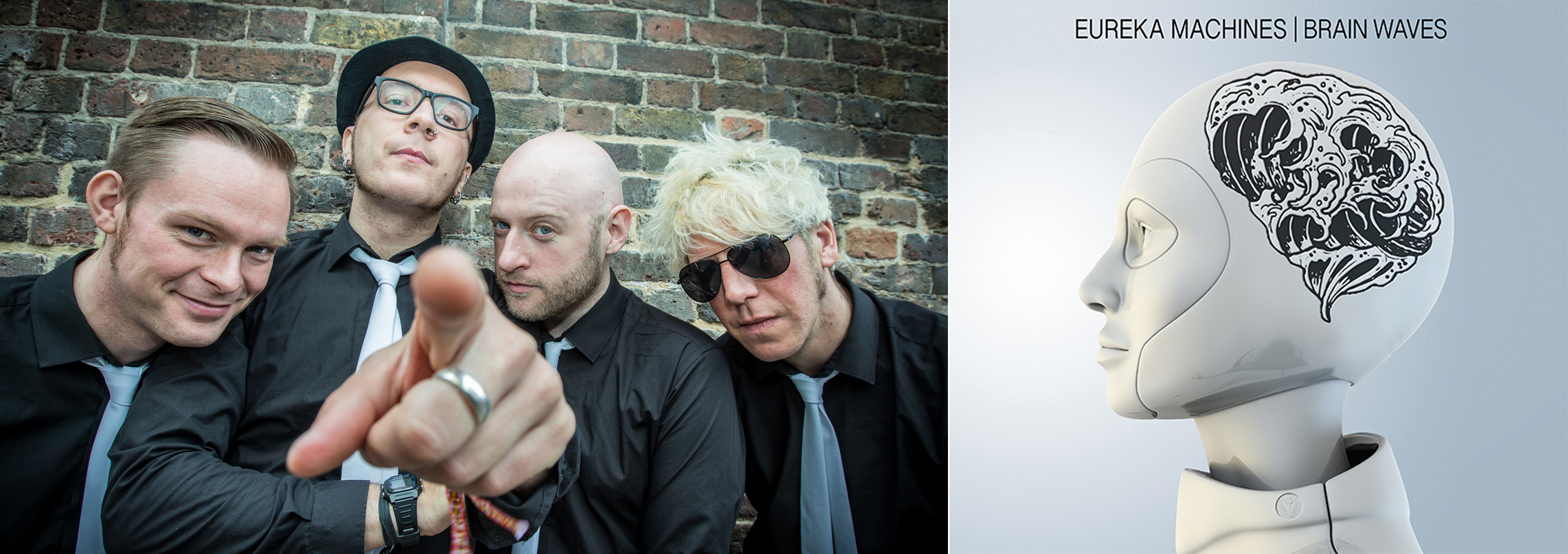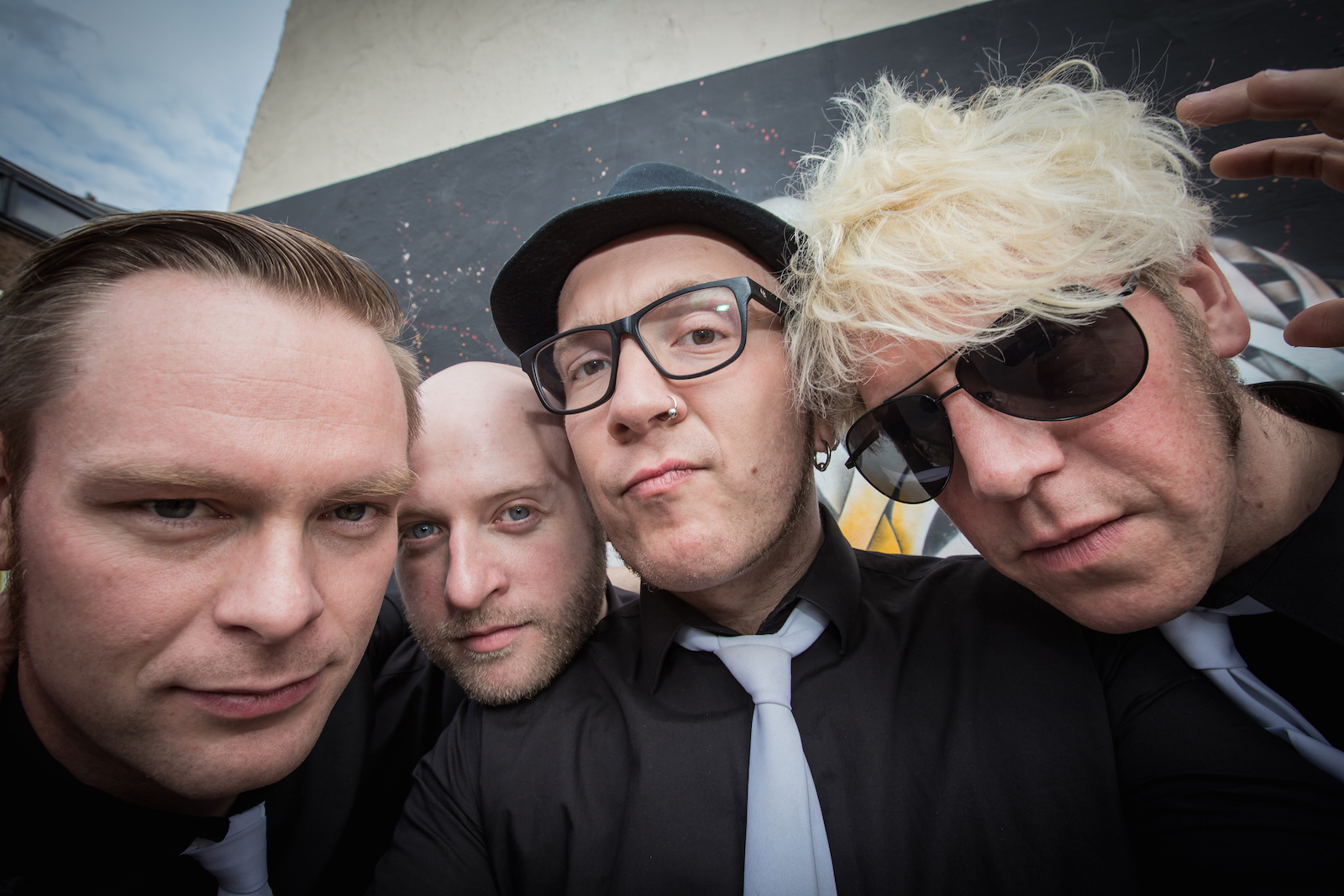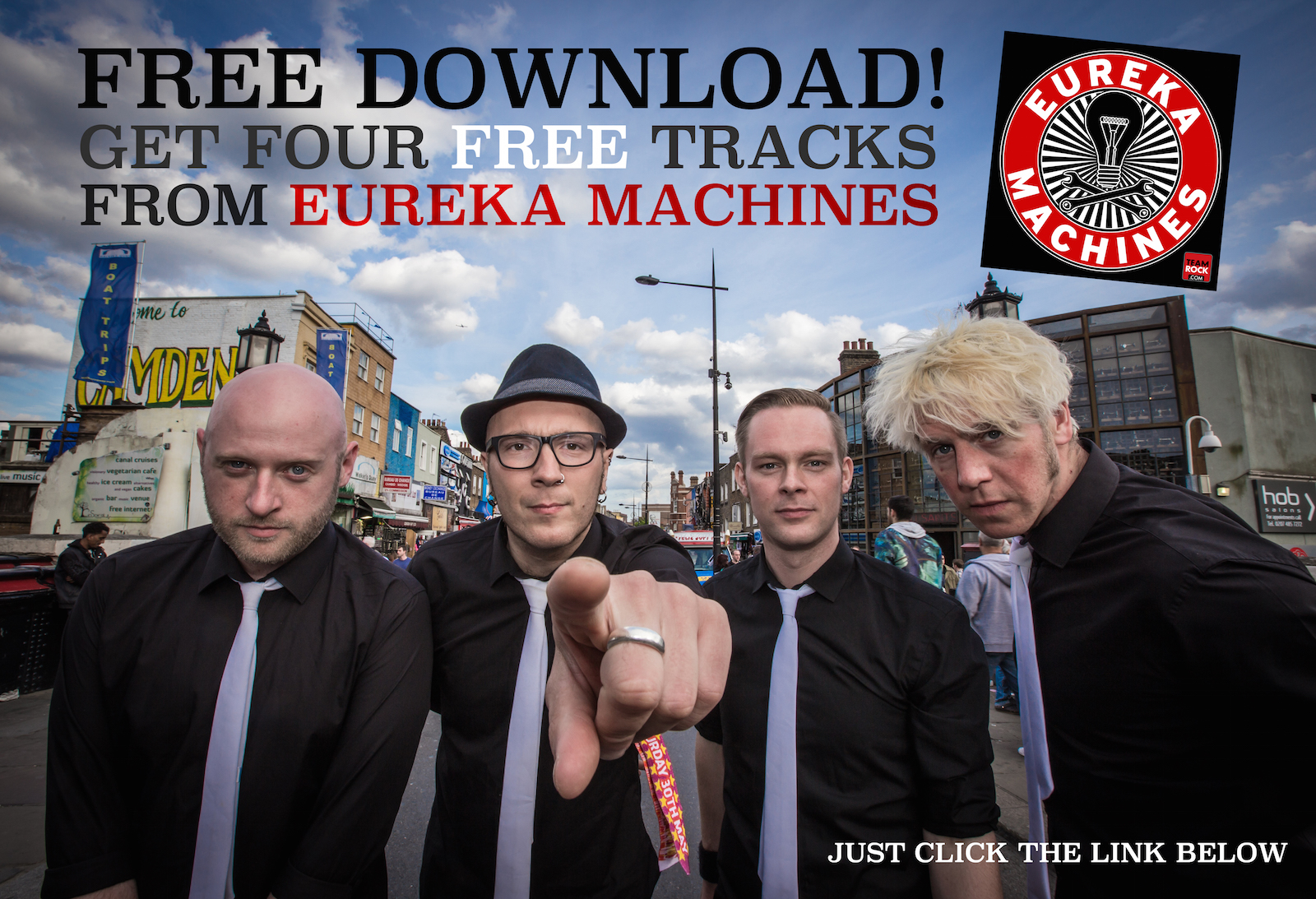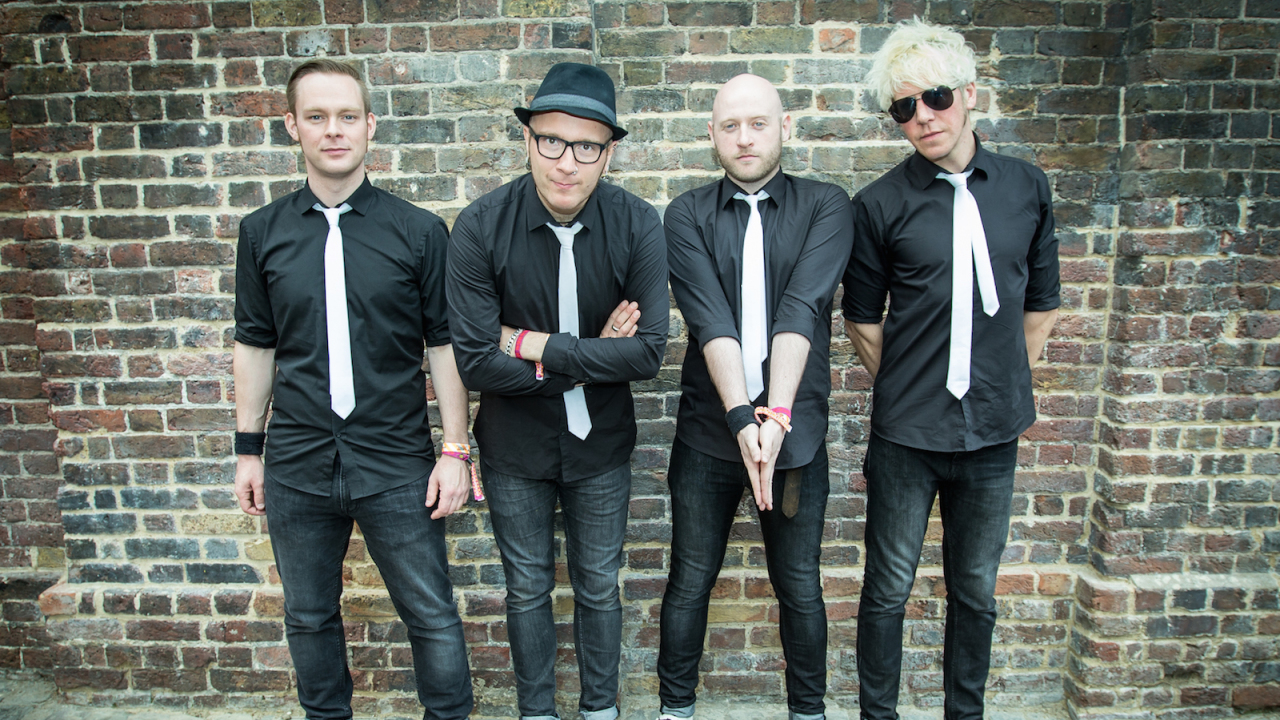This is the story of how an independent band from Leeds became the highest selling rock act in the UK.
With the release of their fourth full-length effort Brain Waves, Leeds-based four-piece Eureka Machines found themselves in the top three of the UK Top 40 Rock Albums at the beginning of the summer. Guns N’ Roses’ Greatest Hits were hogging the top slot, having already in been the charts for a whopping 564 weeks. Then, in second place were Fall Out Boy, whose sixth studio album American Beauty/American Psycho sold over 200,000 copies in its first week alone.
Two massive bands, then, backed by massive teams: global labels, managers, press officers, marketing, and so on. But Eureka Machines, on the other hand, are a small independent band from Leeds, with no record label, no management, and no press team working with them to promote their music. They are 100% DIY. So how did they manage to outsell every rock band in the UK, and be held back from a Number One UK Rock Album only by two of the biggest bands in the business?
Here then, in founding member Chris Catalyst’s own words, is the saga behind of one of the most unlikely and inspirational recent success stories in rock…
Eureka Machines started up in 2008, with a bag of ideas and two bags of ambition. I had spent a good few years touring as a jobbing musician with the great, the good, and occasionally the downright weird, and I felt like I had sussed out a way of making it work. It would take a while longer than I had hoped.
I’d been mates with Dave – aka Davros – since we were kids, where we’d met at some risible ‘battle of the bands’ situation in Selby. We’ve been working together on and off for a hundred years now, and he and I finish each other’s musical sentences. Drummer Wayne once said we’re like an old married couple, and that’s not far from the truth – but without the sticky stuff.
Wayne Insane (drums, obviously) taught himself on the pots and pans at his mum and dad’s. He’s been obsessed with the world of percussion having been brought up on Led Zeppelin and The Who, and all those other bands that drummers go on about. I met him when I saw his old band Vatican Jet at the Brudenell Social Club in Leeds – an important place for our band. At that time, I thought I had a bit of a name for myself and tried to poach him for this new band I was hoping to do. He told me no, this was his band, and that sense of loyalty really impressed me. A few months later, when I heard they’d split up, I got straight on the phone to him and he was in.
Bass player Pete was the final piece of the jigsaw. He didn’t play the bass, but he liked really good music and really wanted to join the band. He could learn on the job, he said, and he did; replacing our mate Steve from The Scaramanga Six, who had done the first year of the band as a favour. Pete is the dark horse of the band. He likes to be contrary, but it’s good to have a different opinion.
When we started, the music industry was heading towards its final death throes, but I would be lying if I said we didn’t have ideals of a record deal, management, an agent, and so on. I come from a background of Getting Things Done, so when these things didn’t land in our collective laps, I bit the bullet and ultimately ended up becoming the band’s agent and manager, etc. There are enormous, cavernous, huge advantages to this. There are also downsides, which I’ll get into later.
Creatively, the decision to remain independent was a no-brainer. Why would anyone want to change their music at the whim of some A&R clown whose legacy is two cassette demos playing dodgy bass in a funk band from Bristol? These people are not generally motivated by art; they’re motivated by money, or status. A mate of mine’s band – who went stratospheric in the ‘00s – were told by one A&R chimp that they had ‘too many good songs’. The justification being, ‘If you see a band and they’ve got more than two catchy good songs, then it confuses the audience and they don’t know what to hum on the way home’. How demeaning is that?
The thing is, as soon as you’re on the Music Industry Gravy Train, suddenly you’re making money for a bunch of other people, all of whom are taking their cut before you get yours. It’s not about the money (if we were doing this for the money, we’d be doing something else) but it is about being sensible. And also having principles.
As an example, only this morning, we got offered £400 for a gig based on 350 tickets being sold at a tenner each. So we could make a bunch of money for other people, or we could do a bit more graft and hire the venue and put the gig on ourselves – it doesn’t take Carol Vorderman to do the maths. This kind of thing is just the industry standard, and the guy offering it is a good guy with a good reputation. But it just doesn’t make any sense for a band like ours, who have a bit of a business brain, and are willing to put in the work.
The saddest thing of all is that if you DO play the game, then of course your potential to do bigger stuff is made far bigger. But I like to play the odds. More on this later, too.
Early on, we took the decision to go out and work; to play any and every gig we could; to hone our live act and (most importantly) to have as many laughs as possible. We learned how to play together, we got really good, we picked up a bunch of followers who’ve stuck around, and we drank a LOT of poor-quality lager.

Photo: Alison Clarke
Before we were even a full band, Wayne and I recorded a bunch of demos, which later Dave added to and we released as our debut album Do Or Die – a name that I had shamelessly borrowed from one of my favourite bands, Super Furry Animals. Putting this out was a huge learning curve, and I realised why the task of putting together a ‘campaign’ for a record is usually upheld by dozens of people, rather than one person working from his bedroom. However, this learning curve continued (and continues) to curve, as I realised what those potential dozens of people would never have over me: they would never care more about our band than we did, and ultimately they would never care about the people who came to see us more than we do.
In terms of standout tours, there’s the two weeks we did around the UK with Electric Six in 2010… that was a great slog for us. We’d finally sussed out a way of doing everything ourselves. We’d managed to buy a van with the money from the debut album, which allowed us to be totally self-sufficient. We’re no strangers to graft so we’d be doing the driving, loading our own gear, selling the merch… thus meaning that overheads were practically zero. We made a profit off that tour, which is pretty unheard of for a support slog.
We also toured with The Wildhearts a couple of times in 2012⁄13, which was fantastic for us. There’s a crossover as I’ve worked with Ginger in various forms now for almost a decade, so the fans kind of knew a bit about us, and of course they were up for guitar-driven harmony-led rock with big tunes. A lot of folk from those tours still come to see us now, and that band (and that bloke) have a very dedicated following who are very supportive of lots of great bands, which is a testament to their hard work too.
Overall, however, our favourite ever tour was the one we’ve just finished, supporting our new album Brain Waves. Twelve dates around the UK with zero marketing spend, only word of mouth and the internet. And we sold half of them out.
Like I said, I like to play the odds.
If Eureka Machines signed to a record label, there’s probably a 50% chance it would be a quarter-decent deal. Then there’s probably a 50% chance that the person who’s putting the records out isn’t going to totally fuck it up. There’s probably a 30% chance that the press agent you hire (and we’re talking at least £2000 for an album campaign) is going to get you anything much more than you could get yourself. There’s probably a 20% chance that a manager with a dozen bands on his/her books is not going to be more interested in the other 11 bands who are making them a load more money.
And then, with all of that combined, adding expense and subtracting their percentages, there’s probably a 1% chance that your band will ever actually amount to anything beyond the first two years of £50 filler slots at festivals and demeaning ‘buy-on’ tours, going onstage at 6.30pm.
But of course, every band believes that it’s going to be different for them. You wouldn’t do it otherwise. After all, their guy signed so-and-so (meaning he has various other agendas) and this manager looks after so-and-so (meaning they probably won’t have any time to do anything for your band). They choose to believe the bullshit – and it is a choice – because it massages their ego. And, hey, you’ve got to be in it to win it.
But you’re left with this 0.0000000002% chance of ‘making it’, whatever ‘making it’ actually means anymore. And a far higher chance of ending up jaded, disillusioned, and not being able to go for a pint on a Saturday night with your pals for fear of getting your nose broken for no reason than ‘being that bloke off the telly’. Inevitably, there’s a 98% you’re going to end up a bitter old man with fuck all to show for decades of hard work. ‘It’s a shit business.’
If you do it all yourself, this tiny chance might well disappear, and you won’t be getting pissed every night on tour… but at least with a bit of savvy and a lot of graft you’re going to be able to sustain it, so you can continue to be creative and – most importantly – have a load of laughs.
Otherwise, what is it for?
The main problem for an utterly independent band like us comes in the fact that so much of the industry is in each other’s pockets. Consequently, because we’re not making any money for anyone – that cabal of label, management, agent, press – they close ranks. I don’t think they collude to do this, it just happens, by some kind of London osmosis.
So, for instance, we can’t generally get on festivals because we don’t have an agent who can offset the offer for one of his bigger bands with a promise to get half a dozen of his £50 bands on the bill as well. The technical term for this is ‘having a dick to swing’, and sadly, at least in that respect, we really don’t.

Photo: Alison Clarke
Ultimately, it’s the people who come to see us that are half of the reason we do this. The other half is the utter doss of getting to play music with your three best mates (and Matt, our great pal who helps us out driving and setting up). It sounds trite, but the people that come and see us are more than ‘fans’. If anything, that word demeans the relationship as it suggests some kind of subservience on their part. It’s very much a two-way thing, and I’m always very keen to foster that, by treating them well, either by giving them a great night out, or extra bonus tracks and stuff for their early investment in our Pledge campaign and so on.
One thing we would definitely lose if we got bigger is that relationship with the people who come see us. They understand us, and what we’re like. They do amazing stuff for us too. One Thai fan made an entire Thai banquet for the four of us, putting it into takeaway containers so that we could eat it back to the Travelodge we were dossing at. She even made me (the annoying vegetarian) my own dish, and put in four cans of Thai lager for us to enjoy with it. I doubt that happens further up the ladder…
There’s another guy who makes us pies every time we play the North West. And there’s a Japanese couple who’ve flown over from Osaka to see us three times. They saw a post I’d put on Instagram about running out of spoons, so brought me some Eureka Machines (black and white) cutlery. Someone also made me a brilliant Eureka Machines hip flask. And I recently got asked to hand-write some of my lyrics out with a proposal at the end, which a guy gave to his girlfriend to ask her to marry him. She said yes, fortunately. All this stuff matters ten million times more to us than money, or getting a free pair of trainers for being on the cover of such and such magazine.
The success (relatively speaking) of our new album Brain Waves was almost entirely down to the amazing people who support this band, and it was a victory for all of the brilliant independent bands we play with in the UK, all of whom work just as hard as us. I would love to see more bands doing it. One thing that I hate is that weird competition that some bands have. Music should be a celebration, a community. We’re all struggling; we should all help each other out. The industry train is running out of gravy. They are shitting themselves. There’s always going to be a place for labels and the industry, but part of our job is to prove that, with guile, determination, graft and imagination, there is an alternative, which doesn’t involve pandering to corporations or mass media.
It’s not easy, and it’s never going to be easy, but we’re doing our best and being the best-selling British rock band in the UK – even if it was only for one week – proves that it can be done. It’s out there for the taking, for all of us.

Chris Catalyst was talking to Matt Stocks. Photos by Alison Clarke.
For an exclusive 4-track download from Eureka Machines, click here. The band kick off their tour in October. For full details, click here.
